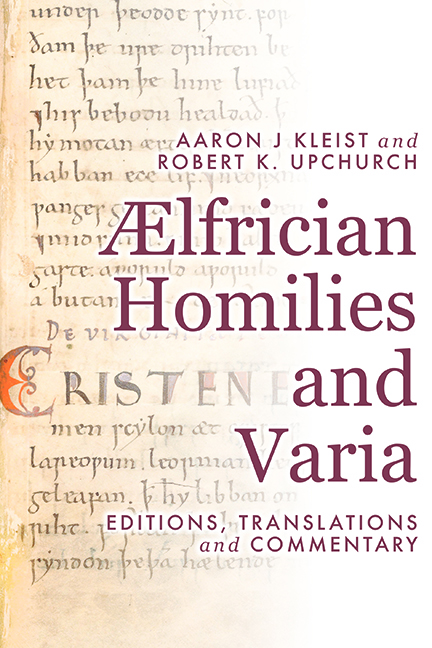Book contents
- Frontmatter
- Contents
- Preface
- Acknowledgements
- Abbreviations
- Sigla for Cited Ælfrician Manuscripts
- Dates for Cited Ælfrician Works
- Editorial Conventions
- Conventions Used in the Commentaries
- Homilies The Proper of the Season
- Homilies The Proper of the Saints
- Ælfrician Homilies and Varia: Editions, Translations, and Commentary: Volume II
- Homilies The Common of the Saints
- Homilies Unspecified Occasions
- Varia
- Works Cited
- Index
- ANGLO-SAXON TEXTS
21 - Gebedu on Englisc (‘Prayers in English’)
Published online by Cambridge University Press: 05 March 2024
- Frontmatter
- Contents
- Preface
- Acknowledgements
- Abbreviations
- Sigla for Cited Ælfrician Manuscripts
- Dates for Cited Ælfrician Works
- Editorial Conventions
- Conventions Used in the Commentaries
- Homilies The Proper of the Season
- Homilies The Proper of the Saints
- Ælfrician Homilies and Varia: Editions, Translations, and Commentary: Volume II
- Homilies The Common of the Saints
- Homilies Unspecified Occasions
- Varia
- Works Cited
- Index
- ANGLO-SAXON TEXTS
Summary
Ælfric grouped ten Old English prayers with his versions of the Paternoster and the Apostles’ and Nicene Creeds in Cambridge, University Library, Gg. 3. 28 [K], a manuscript he compiled with priests in mind. He assembled the group under the heading ‘Here is Belief, Prayer, and Blessing for Laypeople who do not Know Latin’, and the rubric Gebedu on Englisc (‘Prayers in English’) refers to the eight prayers and two blessings he included as private prayers the laity could memorize. Because the treatise De penitentia (AH II.19) follows the prayers in K and prescribes haglig gebedu (‘holy prayers’) as one remedy for sins, we might imagine priests teaching lay Christians the short petitions in the context of confession. The orthodox doctrine and model deportment that characterize proper penitential practice feature in the prayers for good works (I), strong faith (II), protection from enemies (III), wisdom (IV), patience (V), love (VI), protection from temptation (VII), and mercy (VIII). The two Trinitarian blessings, one to accompany the Sign of the Cross (IX) and the other to profess faith in the Triune God (X), cultivate devotion to a doctrine dear to Ælfric and one he highlights in De penitentia. The first seven of these eight gebedu translate Latin prayers used in the liturgy. The prayer for mercy (VIII) and two blessings (IX–X) depend on Scripture to varying degrees, so Ælfric is transmitting ‘highly orthodox private devotional materials for the laity’. If the teaching of these prayers represented an opportunity to extend individually ‘the habits of prayer shaped in confession … [to] private prayer in the home’, then their memorization would reinforce beliefs and behaviors Ælfric taught collectively through his two series of Catholic Homilies, copies of which K includes.
These ten prayers are extant only in K, but the singularity of their survival should not obscure the fact that the group accounts for more than a third of the corpus of twenty-eight prayers for private devotion in Old English prose. No other Anglo-Saxon manuscript contains more prayers. Nor should their survival in a single codex diminish the light they shed on the importance Ælfric places on private devotional prayer.
- Type
- Chapter
- Information
- Ælfrician Homilies and VariaEditions, Translations, and Commentary, pp. 909 - 928Publisher: Boydell & BrewerPrint publication year: 2022

